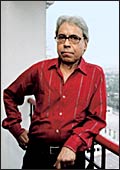|
Mysore
aspires to be the next big thing in Karnataka after Bangalore,
Pune has retained some of its greenery, and its status as a university-town,
yet grown into one of the country's most happening it hubs, and
Kolkata would like the world to know that the city is witnessing
an industrial renaissance of sorts. All three cities are similar;
they are re-inventing themselves without trying to lose what once
made them special (although long-time residents of Pune would
beg to differ on this count). That, the mixture of the old and
the new has found a surprising group of takers, NRI retirees or
semi-retirees that want to return to India, to a quiet location,
yet not be cut off from the mainstream.
The urge to return to India is driven by
several factors. Some of the NRI retirees now returning to India
are people who left the country in the early 1970s. "We were
first-generation immigrants," recalls Sankar Prosad Dutt,
a civil engineer who spent over 30 years in various locations
in the us before retiring to an 11th floor apartment in Calcutta
Greens in Kolkata. "After retiring, all of us wanted to come
back to our friends and relatives." The low cost of healthcare
in India is another reason why retirees choose to come back to
the country, says Dr A.R. Jayaram, a plastic surgeon who was once
based in Chicago, proffering a pragmatic reason. "We (NRI
retirees) prefer places in suburban areas," adds Lal Khemlani,
a 63-year-old who moved to Pune from the US (where he spent 27
years). He spends three days a week honing his skills on the greens
and the other three days working with Clover Builders, a city-based
developer.
|
|
|
PUNE
After 27 years in the US, the Khemlanis settled in Pune's
verdant suburbs
|
Messrs Jayaraman, Dutt and Khemlani are part
of a growing tribe. It includes the likes of Govind Moriani, a
55-year-old early retiree who moved to Pune from West Asia, 77-year-old
K.K. Murty who returned to Mysore after several years in Africa
and the West Indies, and 53-year-old Pradeep Paul who moved to
Kolkata after spending over two decades running a trading firm
(he still runs it out of Singapore, but is based in Kolkata).
|
|
|
KOLKATA
The desire to be close to friends and relatives made engineer
Dutt move back to India
|
Real estate developers in the three cities
have reason to be happy: most NRI retirees aren't just in the
market (for a flat, villa, even farmhouse); they have the financial
resources to make upfront payments. Not surprisingly, developers
are scrambling to provide 'first-world' amenities such as piped
gas, solar heating systems, even vermiculture pits. "Prices
in these areas (preferred by NRI retirees) are increasing every
day," says Mahesh Khinvasara, who runs an eponymous property
development firm in Pune. In Mysore, the Brigade Group, a large,
Bangalore-based real estate developer, boasts six developments
and is scouting for more; Sankalp Developers is putting the final
touches on a 1,000-apartment condominium; and Purvankara, another
Bangalore-based developer that recently formed a joint venture
with Singapore-based Keppel, is planning a Rs 30-40 crore development.
"NRI retirees constitute 30 per cent of our clientele,"
says Jagdeesh Babu, Managing Director, Sankalp Properties. "They
look for villas or luxury apartments that can cost anything between
Rs 25 lakh and Rs 40 lakh."
While some developers in the three cities
have dynamic online (think internet) interfaces to attract NRI
retirees, others have ventured into roadshows. Bengal Shrachi,
a Kolkata-based developer, for instance, recently organised roadshows
showcasing its Bengal NRI Complex in the US, Dubai and Singapore.
"The response has been overwhelming," says Rahul Todi,
the company's Managing Director. While the intangible value of
returning to India isn't something that can be measured, for developers
such as Todi and Babu, it means greenbacks, lots of them.
|






